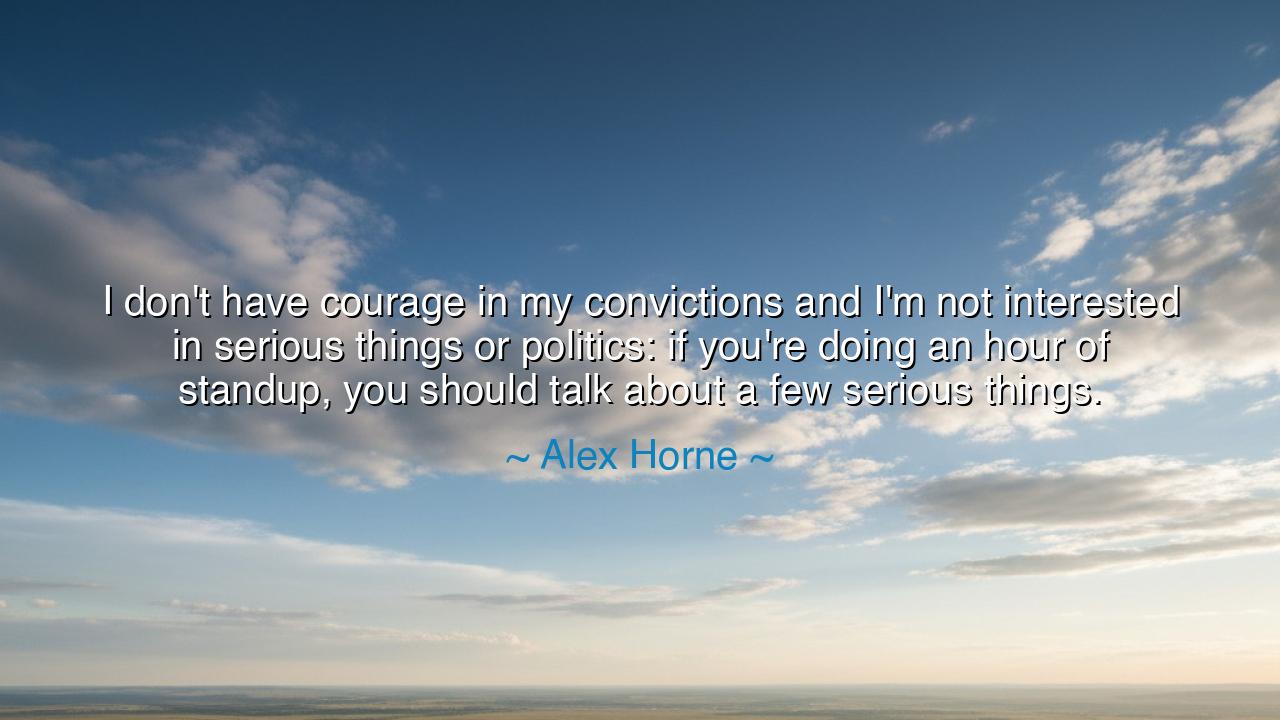
I don't have courage in my convictions and I'm not interested in
I don't have courage in my convictions and I'm not interested in serious things or politics: if you're doing an hour of standup, you should talk about a few serious things.






In the words of Alex Horne, “I don’t have courage in my convictions and I’m not interested in serious things or politics: if you’re doing an hour of standup, you should talk about a few serious things,” we hear the humble confession of an artist, a man who understands both his limitations and the deeper calling of his craft. These words are not mere self-deprecation — they are a meditation on courage, conviction, and the sacred duty of truth-telling that lies hidden beneath laughter. For though comedy delights, it also reveals; it holds up the mirror to society, and in its reflection, truth often glimmers, sharp and unyielding. Horne’s words remind us that to speak of serious things, even in jest, requires the kind of bravery that not all possess.
The origin of this quote comes from Horne’s reflections as a comedian known more for whimsy and play than for biting political satire. His career — from the creation of Taskmaster to his uniquely lighthearted live performances — shows a man devoted to joy rather than judgment. Yet, in these words, he acknowledges an ancient truth that all artists must face: that laughter, though a balm, can also be a weapon of insight. To speak of the world’s troubles with wit and grace is to step into the role of philosopher — a role that demands courage of conviction. Horne admits that he lacks this, and in that admission lies a quiet wisdom: the awareness that not every soul is called to challenge kings, but every voice can still uplift humanity.
The ancients, too, understood this tension between art and truth. The playwright Aristophanes used comedy to strike at the folly of war and politics in Athens, masking critique beneath laughter. His plays made audiences roar — yet they also made them think. In contrast, the poet Sappho spoke not of politics but of the heart, of longing, of beauty — and through that, she reached the eternal. Both paths, though different, required courage: one to confront the world, the other to embrace vulnerability. So too does Alex Horne’s statement reveal that courage comes in many forms — that one may lack the boldness to fight, yet still possess the tenderness to heal.
Consider the story of Charlie Chaplin, whose silent films transcended laughter. At first, he was known for slapstick — a figure of levity. But as the world darkened under tyranny, he found the courage to speak through art. In The Great Dictator, Chaplin risked his reputation and safety to mock fascism and plead for peace. He used humor as a blade and compassion as his guide. Yet, as Horne implies, not every comedian must walk that road. Some are born not to fight but to comfort — and there is honor, too, in bringing joy without sermon. The key lies in knowing one’s heart, and serving truth in the way one is fitted to serve.
When Horne says, “You should talk about a few serious things,” he reminds us that art, even when light, carries a moral responsibility. The jester, though free of title, speaks to kings and crowds alike — his words echo in the hearts of those who laugh. To waste that gift on frivolity alone is to let the sacred power of the stage fall silent. But to speak from a place of false conviction is equally empty. Thus, the true artist must strike a delicate balance — to bring meaning wrapped in mirth, to let laughter open the soul so that wisdom might enter softly.
In this, there lies a deeper teaching for all, not only for comedians. Every person, in their own way, performs upon the stage of life. To live with courage in one’s convictions means to speak truth even when it trembles on the tongue, and to remain silent when one’s truth is not yet born. Horne’s humility reminds us that self-awareness is itself a kind of wisdom — for only those who know their limits can grow beyond them. To confess one’s fear of seriousness is already to take the first step toward sincerity.
Let this be the lesson: not all are called to be prophets, but all are called to be authentic. Whether your gift is laughter or logic, beauty or bravery, offer it honestly to the world. Speak, as Horne suggests, of “a few serious things” — not to lecture, but to connect, to remind others that joy and sorrow share the same soil. Do not fear the weight of truth, for it does not crush the heart that carries it with compassion.
So remember, O seeker of meaning: courage is not the absence of fear, but the quiet persistence of sincerity. Whether you stand before a crowd or live in the stillness of ordinary days, let your words — even your laughter — be guided by truth. For in the end, as Alex Horne teaches, even a humble heart that fears seriousness may still, through its gentleness and humor, bring light to the world’s darkest corners.






AAdministratorAdministrator
Welcome, honored guests. Please leave a comment, we will respond soon